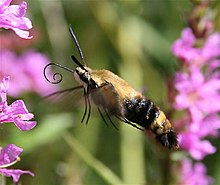This article needs additional citations for verification. (August 2021) |
Hemaris diffinis, the snowberry clearwing, is a moth of the family Sphingidae. This moth is sometimes called "hummingbird moth" or "flying lobster". This moth should not be confused with the hummingbird hawk-moth of Europe.
| Snowberry clearwing | |
|---|---|

| |
| Hemaris diffinis in Augusta, Michigan | |
| Scientific classification | |
| Domain: | Eukaryota |
| Kingdom: | Animalia |
| Phylum: | Arthropoda |
| Class: | Insecta |
| Order: | Lepidoptera |
| Family: | Sphingidae |
| Genus: | Hemaris |
| Species: | H. diffinis
|
| Binomial name | |
| Hemaris diffinis | |
| Synonyms | |
| |
Adults
editIt is about 32–51 millimetres (1.25–2 in). The moth's abdomen has yellow and black segments much like those of the bumblebee, for whom it might be mistaken due to its color and flight pattern similarities. The moth's wings lack the large amount of scales found in most other lepidopterans, particularly in the centralized regions, making them appear clear. It loses the scales on its wings early after the pupa stage by its highly active flight tendencies.
-
Male dorsal
-
Male ventral
-
Female dorsal
-
Female ventral
Biology
editIt flies during the daylight much like the other hummingbird moths, but it may also continue flight into the evening, particularly if it has found a good source of nectar.
Distribution
editThe moth is found from the Northwest Territories, British Columbia, southern Ontario, eastern Manitoba, and in western Quebec in Canada. In the United States this species has been located in southern California and Baja California Norte, Illinois, east through most of the United States from Maine to West Virginia to Florida. Also seen in the Cariboo region of British Columbia.
Food plants
editThe larvae feed on plants including dogbane (Apocynum), Lonicera, Viburnum, Amsonia, Triosteum, Diervilla,[2] and Symphoricarpos.
Regional names
editHemaris diffinis is notable for its colorful nicknames. In certain parts of Appalachia, including West Virginia, Hemaris diffinis is known as "hummingbird moth" or "flying lobster". These nicknames are derived from its supposed physical resemblance to other (genetically unrelated) animals.
Gallery
edit-
Hemaris diffinis variation
-
Snowberry clearwing (Hemaris diffinis), Lake Junaluska, North Carolina
-
Snowberry moth in Elizabethtown, Kentucky
-
Hemaris diffinis on cosmos
-
Hemaris diffinis nectaring on Abelia
-
Caterpillar
-
Feeding at Buddleja flower
References
edit- ^ "CATE Creating a Taxonomic eScience - Sphingidae". Cate-sphingidae.org. Archived from the original on November 10, 2012. Retrieved October 19, 2011.
- ^ Schoen, Daniel J. (1977). "Floral Biology of Diervilla lonicera (Caprifoliaceae)". Bulletin of the Torrey Botanical Club. 104 (3): 234–240. doi:10.2307/2484303. ISSN 0040-9618.
External links
edit